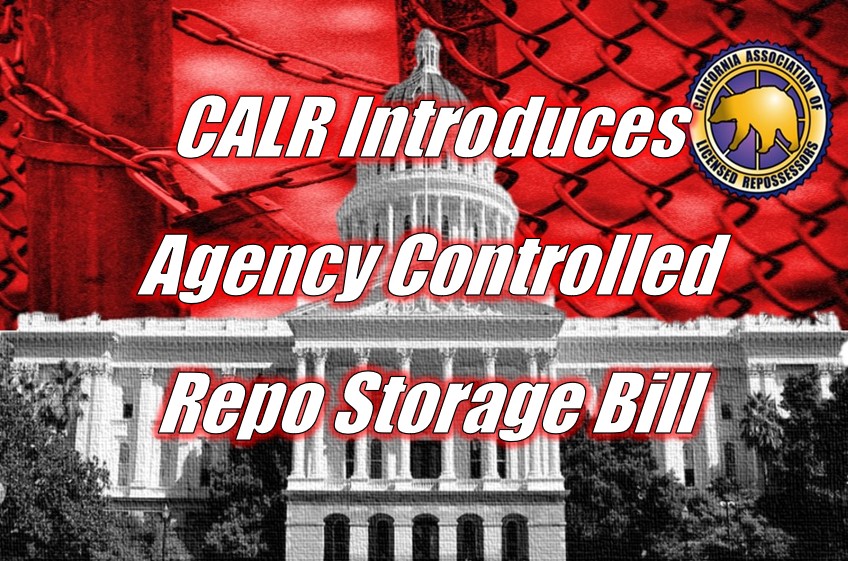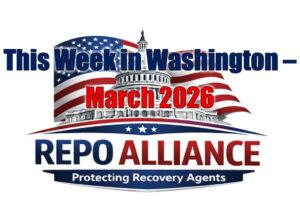CALR Introduces Agency Controlled Repo Storage Bill
“Any charges payable by the debtor to the repossession agency for the storage of the collateral and personal effects from the date of repossession until release of the property from storage,… shall not be determined by any entity other than the repossession agency.”
Sacramento, CA – April 18, 2024 – Storage fees; only the agency can quote and collect them. How much they are is between the borrower and the agency alone. They are confidential and not to be shared with the lender or forwarder. In a nutshell, that’s what is in California Assembly Bill 2228 sponsored by the California Association of Licensed Repossessors (CALR.)
Read the Bill Here!
CALR was the first state repossession association. Through their decades of efforts, they have developed a strong lobbying presence and legal liaison within the state’s capital and with their regulating authority the Bureau of Security and Investigative Services (BSIS).
It is through this collaboration that they have created structure, laws and licensing that became the blueprint later adopted by Florida and Illinois. It is also through these efforts that they successfully combatted the attempts to codify repossession moratoriums via AB 2501 during the Covid pandemic.
Well, they’re at it again and probably wish I wouldn’t show what they been doing behind the scenes, but here it is.
On February 7th, 2024, California State Representative Carlos Villapuda, a Democrat representing the 13th Assembly District, introduced an amendment to Section 7507.10 of, and to add Section 7507.105 to, the Business and Professions Code, relating to collateral recovery. AB 2228, as introduced, Collateral recovery: notice and disclosure.
As described in the Legislative Counsel’s Digest;
Existing law requires the notice to include, among other things, a disclosure of the charges payable by the debtor to the repossession agency for the storage of the collateral and personal effects from the date of repossession until release of the property from storage.
This bill would prohibit any of those disclosed charges from being determined by any entity other than the repossession agency. The bill would also provide that any charges payable by the debtor to the repossession agency for the storage of the collateral and personal effects from the date of repossession until release of the property from storage and the disclosure of those changes are confidential, except under specified circumstances. Because a violation of these requirements would be a crime, the bill would impose a state-mandated local program.
This bill is clearly an attempt at stopping repossession forwarding companies from charging storage fees that the repossession companies do not bill or get paid for.
From a consumer standpoint, it is only fair that they only be charged for fees that were genuinely charged by the actual repossession agency and not a padded fee that goes straight into the pockets of the forwarders. If you recall, it was just over a year ago that the CFPB stated that anything billed above what the lender actually paid for the repossession or services is an unfair, deceptive and abusive practice (UDAAP.)
“Examiners found that the servicers engaged in unfair acts or practices when they charged estimated repossession fees that were significantly higher than the costs they purported to cover. The relevant contracts permitted the servicers to charge consumers default-related fees based on actual cost, but here the fees significantly exceeded the actual cost. Charging the fees caused or was likely to cause substantial injury in the form of concrete monetary harm.”
AB 2228 clearly takes aim at this UDAAP that passes unearned expenses on to borrowers for vehicle and personal property storage fees from forwarding companies. While the liberal dominated California state house is not necessarily a repossession industry friendly body, it is a consumer-friendly body. And if it benefits the consumer in their eyes, it stands a fair chance of passing but there are some hurdles.
Time will tell, but it’s another great example of the power of a state repossession association by CALR. Great job.
Kevin Armstrong
Publisher











More Stories
ATR Driver Critically Injured in Semi Collision – Needs Help!
Tragedy Strikes Benchmark Recovery Family – Help Needed!
Gun to the Head: Conviction in the Slidell Repossession Nightmare
Undercover ATF Pose as Repo Men to Take Down Illegal Gun Dealers
Gun Drawn on Friday the 13th Repo
National Dealer Association Responds to Senate Repossession Probe